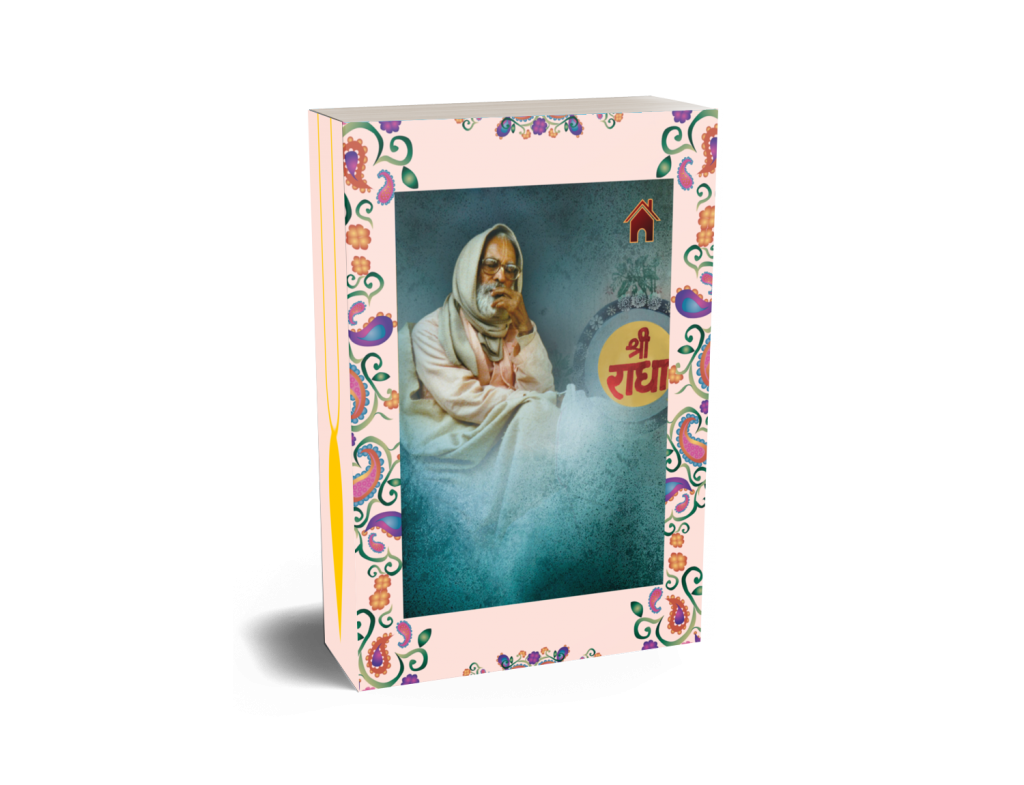

Chapter 5 from the book, Going Beyond Vaikuṇṭha, 4th edition by Śrīla Bhaktivedānta Nārāyaṇa Mahārāja
Vaikuṇṭha is an expansive land. Included within Vaikuṇṭha are Ayodhyā, Jagannātha Purī, 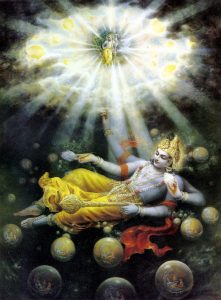 Dvārakā, Mathurā, Vṛndāvana, Govardhana and Rādhā-kuṇḍa. Residing there is not only Kṛṣṇa, but millions and millions of incarnations of Bhagavān. In the four yugas, in a manvantara, in the two fifty-year segments of Brahmā’s life, Bhagavān descends in some form or other. Upon His devotees’ attainment of perfection, according to their own specific devotional sentiment they go to live with Him in a particular section of Vaikuṇṭha, taking darśana of their favourite Lord and serving Him there.
Dvārakā, Mathurā, Vṛndāvana, Govardhana and Rādhā-kuṇḍa. Residing there is not only Kṛṣṇa, but millions and millions of incarnations of Bhagavān. In the four yugas, in a manvantara, in the two fifty-year segments of Brahmā’s life, Bhagavān descends in some form or other. Upon His devotees’ attainment of perfection, according to their own specific devotional sentiment they go to live with Him in a particular section of Vaikuṇṭha, taking darśana of their favourite Lord and serving Him there.
The sun is reflected in anything that acts as a mirror, but the sun and the reflection are not one. Bimba means ‘the sun’, and pratibimba means ‘its reflection, which shines in another world’. They are not one, but there is some similarity between them. Unlike the sun, however, there are many, many incarnations of the Lord. Each and every incarnation is directly Bhagavān Himself, and all are eternal, spiritually conscious and blissful (sac-cid-ānanda). In Vaikuṇṭha, Bhagavān is not situated in kāya-vyūha expansions; instead, in qualitative oneness, He is situated in many different forms for fulfilling the desires of His devotees. In the Rāmāyaṇa and other scriptures it is said that Bhagavān is one, and according to the form for which the devotee is praying, He assumes an incarnation as either Nṛsiṁha-avatāra, Kūrma-avatāra, Vāmana-avatāra, Hayagrīva-avatāra – so many incarnations. Bhagavān can come in many forms. Some say that originally Bhagavān has no form, and that when anyone of this world calls Him, then according to that person’s particular sentiment, He takes a corresponding form and appears in this world. But this idea is incorrect. All of His forms are real and eternal, and when devotees call Him by the name of a specific form, then in that very form He comes. All the scriptures declare this, and they are fully authoritative due to being completely free of any defect.
There are those who worship Lakṣmīpati Nārāyaṇa with mantras such as oṁ nārāyaṇāya namaḥ and oṁ 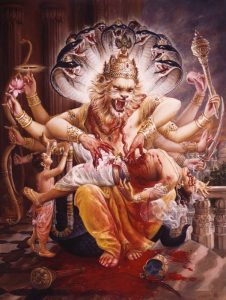 namo bhagavate vāsudevāya. Dhruva attained perfection through this process. Some chant oṁ varāhāya namaḥ to worship Varāha in Navadvīpa-dhāma, some chant oṁ nṛsiṁhāya namaḥ or other mantras of Nṛsiṁhadeva, and upon attaining perfection those devotees will go to Vaikuṇṭha, but to a special chamber in Vaikuṇṭha. How is Nārāyaṇa situated there? In one place in His Nṛsiṁha form, and in another place in His Varāha form. When there is a necessity in this world for the presence of a particular form, then He comes in that very form. For example, when Kṛṣṇa comes, He comes holding the flute, as Nanda-nandana. He never changes His form. He remains in one form, yet He changes the secondary aspects of His pastimes in a special way. His performing the rāsa-līlā with the gopīs and playing as a child at the house of Nanda – these pastimes are eternal, but He may change the killing of Kaṁsa. Instead of Kaṁsa it may be Jarāsandha or some other person. According to the necessity of the time the secondary pastimes may be changed, but the eternal līlās remain the same.
namo bhagavate vāsudevāya. Dhruva attained perfection through this process. Some chant oṁ varāhāya namaḥ to worship Varāha in Navadvīpa-dhāma, some chant oṁ nṛsiṁhāya namaḥ or other mantras of Nṛsiṁhadeva, and upon attaining perfection those devotees will go to Vaikuṇṭha, but to a special chamber in Vaikuṇṭha. How is Nārāyaṇa situated there? In one place in His Nṛsiṁha form, and in another place in His Varāha form. When there is a necessity in this world for the presence of a particular form, then He comes in that very form. For example, when Kṛṣṇa comes, He comes holding the flute, as Nanda-nandana. He never changes His form. He remains in one form, yet He changes the secondary aspects of His pastimes in a special way. His performing the rāsa-līlā with the gopīs and playing as a child at the house of Nanda – these pastimes are eternal, but He may change the killing of Kaṁsa. Instead of Kaṁsa it may be Jarāsandha or some other person. According to the necessity of the time the secondary pastimes may be changed, but the eternal līlās remain the same.
Those who worship Nārāyaṇa will go to Vaikuṇṭha, but to which chamber in Vaikuṇṭha? To the specific chamber where Lakṣmī and Nārāyaṇa reside. One who chants japa of the Nṛsiṁha mantra will also go to Vaikuṇṭha, but to a special chamber where there is only worship of Nṛsiṁhadeva. He will never see Rāma or Nārāyaṇa. There are differences in the pastimes of Nṛsiṁha, Varāha and Kūrma, but in tattva, They are all non-different.
Before the advent of Vāmanadeva, the demigods worshipped a special four-armed form of Viṣṇu that was 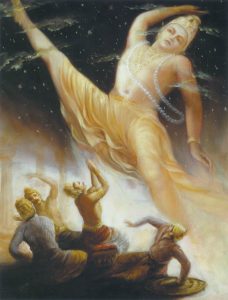 established in heaven for their pūjā. When a special set of circumstances was created, then in a particular form Vāmanadeva was impelled to come and snatch everything away from Bali Mahārāja. At that time Aditi, the mother of the demigods, had performed some austerities, and because of that He came. Therefore Vāmana performs pastimes that are different from the four-armed Viṣṇu who is always present in heaven, but in tattva They are one. Vāmana is a little different from Viṣṇu in that in Vāmana’s pastimes there is some deception, and the giving of some special good fortune also. It seemed like robbery, but in it there was so much kindness and bhakta-vātsalya, special affection for His devotees. He increased the glories of His devotee. He put Bali Mahārāja into difficulty to make his name immortal for all time. If Vāmana had not come, who would know the name of Bali? For protecting His devotees, He came in a very beautiful form. It seems that He came for protecting the demigods and for cheating the demons, but no; actually He benefited both. In reality Bali Mahārāja received more benefit than the demigods. The demigods got no special benefit, but Bali Mahārāja did. Vāmana snatched the desire for material enjoyment away from Bali and gave him bhakti, but He didn’t snatch away the demigods’ facility for enjoyment; rather He provided it by returning their kingdom to them. So to whom was He more kind? But, like Indra, we desire and pray, “O Lord, please don’t snatch our material enjoyment away! Be merciful like this and make our lives plentiful. My son, daughter, money and wife – please don’t take them! I will do bhajana, and they will remain with me also.”
established in heaven for their pūjā. When a special set of circumstances was created, then in a particular form Vāmanadeva was impelled to come and snatch everything away from Bali Mahārāja. At that time Aditi, the mother of the demigods, had performed some austerities, and because of that He came. Therefore Vāmana performs pastimes that are different from the four-armed Viṣṇu who is always present in heaven, but in tattva They are one. Vāmana is a little different from Viṣṇu in that in Vāmana’s pastimes there is some deception, and the giving of some special good fortune also. It seemed like robbery, but in it there was so much kindness and bhakta-vātsalya, special affection for His devotees. He increased the glories of His devotee. He put Bali Mahārāja into difficulty to make his name immortal for all time. If Vāmana had not come, who would know the name of Bali? For protecting His devotees, He came in a very beautiful form. It seems that He came for protecting the demigods and for cheating the demons, but no; actually He benefited both. In reality Bali Mahārāja received more benefit than the demigods. The demigods got no special benefit, but Bali Mahārāja did. Vāmana snatched the desire for material enjoyment away from Bali and gave him bhakti, but He didn’t snatch away the demigods’ facility for enjoyment; rather He provided it by returning their kingdom to them. So to whom was He more kind? But, like Indra, we desire and pray, “O Lord, please don’t snatch our material enjoyment away! Be merciful like this and make our lives plentiful. My son, daughter, money and wife – please don’t take them! I will do bhajana, and they will remain with me also.”
But some pray, “O Lord, You please take all of this away, and give me pure love at Your lotus feet.” Which of these is correct? If in both hands there is a laḍḍū, will you desire both, or only one? If Bhagavān says, “All right, you take the happiness of material enjoyment, and together with that take pure love for Me also,” and He puts both into our hands, certainly we will take the material enjoyment and not the bhakti. However, if we really desire prema, then this enjoying spirit must be eradicated. Otherwise there will be cheating and deception in our bhakti. But ninety-nine per cent of the people in this world desire like this: “Our material enjoyment must remain intact, our family must remain, our money and palatable food must remain, our business must go on nicely, and together with all of this we will have bhakti.” So the Lord says, “All right.” But He gives them only ordinary bhakti to accompany their material enjoyment.
To the demigods Bhagavān gives the responsibility of protecting the world, but the material world is temporary. He says “Do this service for Me” and gives them their posts, but then some of them think, “I have become the master of the three worlds. The Lord has given me this position, and now I am the master of the entire universe.” They don’t understand that this is actually an obstacle to bhakti. So He placed this very allurement in the hands of Indra, and snatched that same allurement away from Bali Mahārāja, giving him pure bhakti instead. Many people do not understand that this is a special activity of mercy He performed for Bali.
Assuming an incarnation in this world and performing such beautiful pastimes is something Nārāyaṇa will not 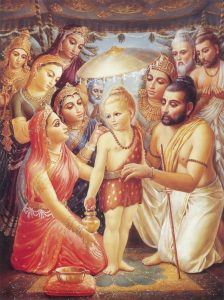 do. The four-armed form that is present there in heaven will not do this. Nārāyaṇa will never cheat as Vāmana did. He will also bestow prema, but He won’t allow Himself to be viewed as a cheater. Vāmana cheated in the vision of ordinary people. He begged for three steps of land, then made His steps very, very large, and stole everything. Vāmana will perform such variegated pastimes and may even be seen as a cheater, but Nārāyaṇa will never do this. So in this way, in the pastimes of Rāma and other incarnations of Bhagavān there is uniqueness. In tattva They are all one, but in His pastimes, His special affectionate dealings with His devotees, and His rasa, there will be some differences.
do. The four-armed form that is present there in heaven will not do this. Nārāyaṇa will never cheat as Vāmana did. He will also bestow prema, but He won’t allow Himself to be viewed as a cheater. Vāmana cheated in the vision of ordinary people. He begged for three steps of land, then made His steps very, very large, and stole everything. Vāmana will perform such variegated pastimes and may even be seen as a cheater, but Nārāyaṇa will never do this. So in this way, in the pastimes of Rāma and other incarnations of Bhagavān there is uniqueness. In tattva They are all one, but in His pastimes, His special affectionate dealings with His devotees, and His rasa, there will be some differences.
In the scriptures it says that there is a final dissolution when the two fifty-year segments of Brahmā’s life have passed. Along with Brahmā, nature will merge into Garbhodakaśāyī Viṣṇu. Then He also will disappear and all will merge into Kāraṇodakaśāyī Viṣṇu. So many jīvas will merge into the limbs of Viṣṇu at that time, and those that are liberated will go to Vaikuṇṭha with Brahmā. The others will again become embodied and return to this cakra, or cycle, of māyā. At that time, Mahā-Mīna, the fish incarnation, is to be seen.
After Mārkaṇḍeya Ṛṣi had been performing austerities for a long time, one day he was bathing in the Gaṅgā and a small fish came into his begging bowl (kamaṇḍalu). He took it home, and then the fish said, “O sage, I have come into your kamaṇḍalu, but there is no space for Me here. Please place Me in a larger body of water.”
Then Mārkaṇḍeya looked and saw that really the fish had become larger. So he placed the fish in a small pond, but after some time, the fish came to him in a dream and said, “O sage, now I am so big, I can no longer stay in this pond.” So Mārkaṇḍeya lifted the fish out and placed Him in the river, but the fish again enlarged in the river and said, “Here also I cannot stay. Please place Me in the ocean.”
By his yogic power Mārkaṇḍeya placed the fish in the ocean. Then he saw in a dream that there was to be a causal dissolution, like the one at the end of Brahmā’s day. The final dissolution comes at the end of Brahmā’s one hundred years, but this and the one that comes at the end of his day can both be called nityapralaya.
The fish said, “The water will be rising and I will come to you. You must collect seeds of all the things in the world – vegetable seeds, a mango seed, a mustard seed, everything. Then you must collect two of each species of bird and animal and be ready to attach a strong boat to Me in the morning when I arrive.”
During the night Mārkaṇḍeya made the arrangement. He made a strong boat with a rope attached to it, and placed the seeds of all species of life in it. When he was ready, he saw that the entire universe was being flooded with flowing water, and nothing could be seen. The water was slowly rising, and gradually covered all of the high places. The fish had assumed a massive form with two horns, and He said, “Bind the boat to My horns.” The sage did so, and Mahā-Mīna took everyone away on the water. This dissolution lasts for one whole night of Brahmā. The sage went without eating or drinking the entire time, and he couldn’t find a place to take some rest. Thinking, “What kind of life is this?”, he was very unhappy.
Eventually they arrived at Prayaga. There, Mārkaṇḍeya could see only a banyan tree and nothing else. At the top of the tree there was only one leaf where Vaṭaśāyī Viṣṇu was sleeping and performing the pastime of sucking His toe. He looked towards the sage very mercifully and consoled him, and transmitted śakti into him. He made an arrangement for the sage’s sustenance and then said, “In a few days this will all be over and you will again become a progenitor (prajāpati), and from Brahmā all creation will again take place.”
This is one Mīna-avatāra. This Mīna incarnation resides in Vaikuṇṭha, and when the necessity arises He comes to this world. His tattva is non-different from Nārāyaṇa. His pastimes are variegated, but in tattva They are one.
Another Mīna incarnation protected the Vedas. The demons had stolen the Vedas and thrown them into the water of the dissolution and the Vedas had disappeared. The tendency of demons is to be greatly destructive, and now also we see that the Vedic scriptures are slowly disappearing. If people don’t respect them, what will happen? They will disappear, slowly. The Vedas will not remain, you won’t be able to find the Bhāgavatam, and such spiritual talks will disappear altogether. The mood of Vṛndāvana and Mathurā will change, and after some time men will also change. They won’t respect holy men and saints, and they won’t respect the Gītā and the Bhāgavatam. Like this, the Vedas had disappeared, and to protect them, another Mīna incarnation appeared.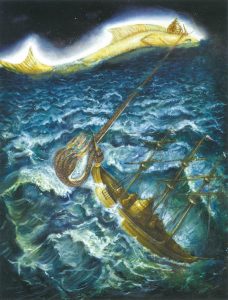
This Mīna incarnation saved Satyavrata Muni, who had at that time offered a prayer known as the Dāmodarāṣṭaka. Taking so many things with him, he stayed in the ocean for a long time, and the Vedas and scriptures were kept in his heart. Again the dissolution was finished, and again in the four directions creation took place. So there is not just one Mīna incarnation, but many. In Vaikuṇṭha also, there are different chambers suitable for Their particular devotees, and Satyavrata Muni’s worshipful Lord is this particular Mīna incarnation.
There is also the Kūrma incarnation. At the time of churning the ocean of milk, the demons and demigods came together and agreed that everything produced from the churning would be distributed. Viṣṇu, through the medium of Brahmā, gave them some advice; otherwise nothing would have been produced. They placed the Mandara Mountain in the middle of the ocean, but there was no foundation for it, so the mountain immediately sank. They thought, “This will be very difficult. How will we remove it from the ocean? How will we find a foundation upon which to churn?”
So they worshipped Viṣṇu, and He came in the form of a tortoise, Kūrma. “For your good fortune, I will accept the form of a tortoise. Place the mountain on Me, wind the snake Vāsuki around it, and then churn.”
They placed the mountain on Kūrma, and wrapped the king of snakes Vāsuki around it. In one direction was the mouth of Vāsuki and in the other direction was his tail. The demigods said to the demons, “Since we are senior to you, we will take the direction of the head. We are worthy of more respect than you.”
The demons replied, “No, we will not give you this respect! We will take the direction of the head. The tail is inferior; we will not take it!” So the demons demanded the head side, not understanding the trickery of the demigods. But the demigods insisted, “You are our little brothers, the sons of Diti. Therefore, whatever is produced by the churning, we will take first and you will take the remainder. And since we are senior to you, we will take the direction of Vāsuki’s head.”
But the demons were adamant. “No, it can never be like that! We are superior! What is this, that we are younger? We are superior, we will take the direction of the head.”
The demigods actually wanted to take the tail end, because they knew that in the midst of the churning, during 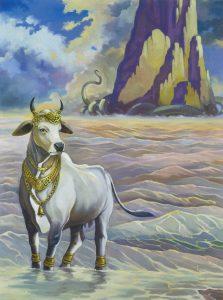 the hissing of the snake, deadly poison would be emitted from his mouth. But the demons didn’t know this. They quickly grabbed the mouth end, and while making a great effort to churn, it became very hot, poison was produced from the snake, and they were burnt. They thought, “The demigods have tricked us! All right; next time we will understand. We will do exactly the opposite of what they say.”
the hissing of the snake, deadly poison would be emitted from his mouth. But the demons didn’t know this. They quickly grabbed the mouth end, and while making a great effort to churn, it became very hot, poison was produced from the snake, and they were burnt. They thought, “The demigods have tricked us! All right; next time we will understand. We will do exactly the opposite of what they say.”
As they churned the ocean of milk, first poison was produced, then Lakṣmī came out, then nectar was produced, Dhanvantari came out, the white elephant of the demigods was produced, a horse was produced, and many other wonderful things. When Lakṣmī-devī appeared, she looked all around and wondered, “Who will I marry?” She began considering, and felt that everyone she saw was full of faults. She saw everyone – even Brahmā – and she rejected them all. Finally Viṣṇu came there, and she put the garland around His neck and married Him.
While the churning was going on, Kūrma had an itching sensation on His back, and the churning movement of the massive mountain scratched His itch. At that time, His breathing in and out created the low and high tides of the ocean. Some say the influence of the moon is the cause of this, but the cause given in the scriptures is correct.
Another Kūrma incarnation appeared in another yuga or manvantara to support the Earth planet throughout its entire duration. These are two separate Kūrma incarnations.
Regarding Varāhadeva, before the creation there was only water. Brahmā heard a sound indicating that he should perform tapasya, austerities. After this he met Nārāyaṇa and heard the four root verses (catuḥ-ślokī) of the Bhāgavatam, and was empowered to create. But for creation there must be a foundation, and at that time there was no base because the Earth was submerged in water. So Varāha, in the form of a very, very small entity like a weevil, emerged from Brahmā’s nose and immediately doubled in size. Then when He was a little distance away, He assumed a form so large that He filled the entire sky, and He jumped straight into the ocean with both His snout and His feet pointed downward. Such violent waves were produced that they even reached up to heaven and Brahmaloka, and water was spread in all directions. When Varāhadeva arrived at Rasātala, He took the Earth on His snout and established it above the water. This is one Varāha incarnation.
There is also another Varāha incarnation who found that when He went to Rasātala, Hiraṇyākṣa was there waiting for Him. Hiraṇyākṣa had been searching for his equal in heroics, and he had asked Nārada where he could find such a person. He was told to go to Varuṇadeva, who told him, “Yes, you will find a suitable opponent, and He will grind you to pieces.”
“Who is this person?”
“Viṣṇu.”
“Where can I find Him?”
“He is everywhere, but finding Him is very, very difficult. When you meet Him, He will destroy your pride.”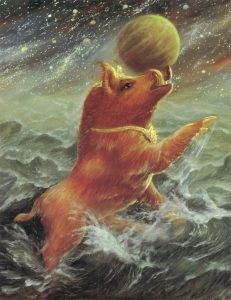
Hiraṇyākṣa was told that if he went to Rasātala at the time of the final dissolution, he would meet Viṣṇu there. He arrived there first, and he remained waiting there for a very long time submerged in the water. Finally Varāha arrived there and took the Earth on His snout, just as a huge elephant holds a small flower or as someone holds a mustard seed; it was so easy for Him. He established the Earth above the water, and then turned to fight with the demon. They fought for thousands of years, and in the end Varāha killed Hiraṇyākṣa with His club, thereby destroying his pride. Then He disappeared. These are two separate Varāha incarnations. One is white, the other is black.
Another incarnation is Yajṣa-Varāha. In each of His pores are millions of brahmāṇḍas, and He accepts the results of sacrifice. By His mercy the Earth heard the Purāṇas – the same ones written by Vyāsa – so from this we can understand that the Purāṇas are eternal. Devotees prayed to this Varāha because the Earth’s surface was too rough and they were unable to do any farming. It would not retain water, and the people could not live without grains and water. So being merciful, Varāha incarnated and with His teeth He uprooted big mountains and made the Earth’s surface smooth. This is the nature of a boar, that with his snout he digs. Afterwards the Earth appeared as if it had been ploughed.
At that time, the Earth personified assumed the form of a female boar. Her name was Dharitrī-devī, and she was the potency (śakti) of Bhū-devī. Viṣṇu assumed the form of a boar, so she became a female boar, and from them Narakāsura was born. Originally his name was Dharitrī-nandana, not Narakāsura, but as a result of falling into bad association he became a demon.
Association is what makes bhakti appear in any heart, and also that which can make it disappear. It is the cause of our bondage or liberation. We will become just like those with whom we keep company, so bad association is the most dangerous enemy of our hearts. By keeping bad company even the son of Bhagavān and the Earth personified became sinful. Whose company did he keep? Duryodhana, Śakuni, Kaṁsa, Jarāsandha – so many personalities who were opposed to Kṛṣṇa – and all were atheistic. He took the association of all these people and then tried to give Bhagavān trouble. Therefore he became known as Narakāsura.
Altogether there are five Varāha incarnations mentioned in the scriptures. They all reside in Vaikuṇṭha, and when there is a necessity for one of Them in this world, He comes and gives darśana to His devotees in that very form. After those devotees attain perfection, they go to Vaikuṇṭha to serve Him directly there as well.
There are different incarnations of Nṛsiṁhadeva as well. One incarnation killed Hiraṇyakaśipu and protected Prahlāda. Another is mātṛcakra-pramatta. Mātṛcakra means those women who were detrimental to the welfare of the world. When their power increased, Nṛsiṁha Bhagavān appeared to subdue them. Another incarnation came in the form of a cat and performed many different pastimes; He also subdued demons and protected devotees.
In South India, there is one deity called Jiyara-Nṛsiṁha and another called Pānā-Nṛsiṁha. They are separate incarnations. They appeared in different kalpas, and there are differences in Their pastimes. There was once a 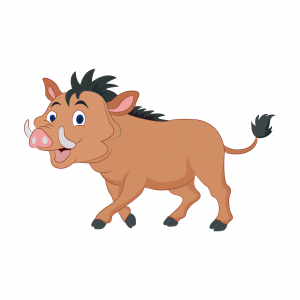 wild boar in a kingdom wherein all directions there were mountains and jungle. In that place was a farmer who was a great devotee. He was growing corn, and every day this boar came and ate it and destroyed his crop. He was upset that his field was being destroyed, so he constructed a platform in the middle of the field. He thought that he would sit there during the night and watch for that boar. That night the boar came and broke everything again, so taking a stick, the farmer got down from the platform and chased it. The boar ran with the farmer following behind and after a little while, laughing, the boar stopped and stood, displaying the form of Nṛsiṁha. “For the purpose of mercifully giving you My darśana, I have done this. Now you can offer corn to Me. It is My favourite food, and I will fulfil all the desires of your heart. Get money from the king and establish Me on top of that mountain where only campā flowers grow.”
wild boar in a kingdom wherein all directions there were mountains and jungle. In that place was a farmer who was a great devotee. He was growing corn, and every day this boar came and ate it and destroyed his crop. He was upset that his field was being destroyed, so he constructed a platform in the middle of the field. He thought that he would sit there during the night and watch for that boar. That night the boar came and broke everything again, so taking a stick, the farmer got down from the platform and chased it. The boar ran with the farmer following behind and after a little while, laughing, the boar stopped and stood, displaying the form of Nṛsiṁha. “For the purpose of mercifully giving you My darśana, I have done this. Now you can offer corn to Me. It is My favourite food, and I will fulfil all the desires of your heart. Get money from the king and establish Me on top of that mountain where only campā flowers grow.”
He was Nṛsiṁha, but He assumed the form of a boar. On the day of akṣaya-tṛtīyā the pujārīs apply sandalwood paste to that deity and He reveals His form as a boar. That’s all – only on one day of the year He gives that darśana. This is Jiyara-Nṛsiṁha, and He appeared in one particular kalpa. Therefore in some places devotees worship a combined form of Nṛsiṁha and Varāha.
In this way, Hayagrīva, Haṁsa – in the scriptures you will find two, four or five of each incarnation, but Their tattva is one. According to the sentiments of Their devotees, and for receiving different types of service from them, They are all eternally residing in Vaikuṇṭha.
Speaking to Gopa-kumāra in Vaikuṇṭha, Nārada is saying, “Here people are performing pūjā of Paraśurāma, of Nṛsiṁha, of Vāmana, of many incarnations. If a devotee comes here and worships a particular deity, and then after some time leaves that pūjā to worship another deity, there is no fault in it. In your lifetime you have worshipped many incarnations of Bhagavān. Therefore according to one’s own niṣṭhā he can go here or there, because Bhagavān is one. I am telling you this because I can see that you do not like it here. Even while residing in Vaikuṇṭha, if your internal svarūpa is that of a cowherd boy, then you will always desire to worship Gopāla. 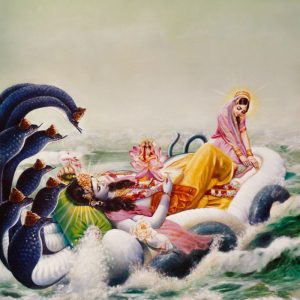 Therefore you are not happy here, but there is no fault in this. This is a very deep thing; it is not written anywhere, but taking your pulse, I have ascertained the reason for your dissatisfaction. Here, will Lakṣmī-devī allow anyone else to massage the feet of her Lord? Will she allow anyone to serve Him food? She won’t. She thinks, ‘It is my duty alone.’ You can only stand at a distance and offer prayers to Him. If some devotee comes here and tries to sit on the lap of Nārāyaṇa, as Prahlāda sits on the lap of Nṛsiṁha, she won’t allow it.
Therefore you are not happy here, but there is no fault in this. This is a very deep thing; it is not written anywhere, but taking your pulse, I have ascertained the reason for your dissatisfaction. Here, will Lakṣmī-devī allow anyone else to massage the feet of her Lord? Will she allow anyone to serve Him food? She won’t. She thinks, ‘It is my duty alone.’ You can only stand at a distance and offer prayers to Him. If some devotee comes here and tries to sit on the lap of Nārāyaṇa, as Prahlāda sits on the lap of Nṛsiṁha, she won’t allow it.
“From here you should continue your journey, and you will experience more variegated pastimes and more intimate rasa. I have explained all of this to you so that first you will understand that all incarnations of Bhagavān are one in tattva. Therefore there is no fault in leaving one incarnation to go to another because They are all one and the same. They only appear different to accommodate the various sentiments of Their devotees.”
Image/Art made possible by Pixabay.com & Krishnapath.org








